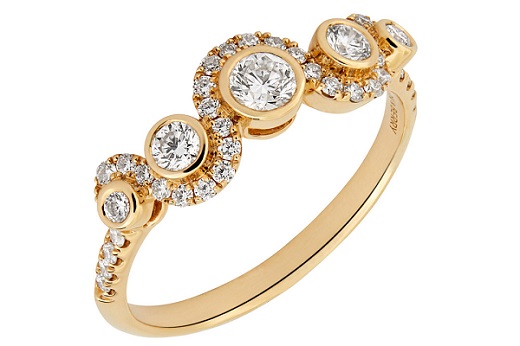DPA Raises Concerns over Synthetics Marketing
 RAPAPORT... The Diamond Producers Association (DPA) is worried lab-growndiamond suppliers will use the new Federal Trade Commission (FTC) guidelines toconfuse consumers - a claim synthetics companies reject.The FTC last month removed the word "natural" from itsdefinition of diamond, enabling growers to claim their stonesare 100% diamond. However, they still must disclose that they are not from theearth. "We understand the basis for this decision," the DPA - analliance of leading miners - said in a statement last week. "But we are concernedthat it will be exploited by man-made diamond marketers, who may feel they canuse the term 'diamond' without properly qualifying it, leading to more consumerconfusion and deception." Yet the lab-grown sector has no intention of falling foul ofthe FTC's disclosure requirements, the International Grown Diamond Association(IGDA) confirmed to Rapaport News. "[Our members] will continue to proudly and openly label andpromote our products as lab-grown, cultured, etc., as defined by the FTC," saidIGDA secretary general Richard Garard in an email Thursday. "There is noquestion that IGDA and our members gladly promote that fact." Garard highlighted the FTC's new stance on the term"synthetic," which no longer appears on the commission's list of recommendedwords for describing lab-grown stones. Competitors use the label to makelab-grown diamonds sound like fakes, IGDA argued to the FTC during its reviewprocess. The "real question" is whether natural-diamond promoters will complywith the updated advice, "since they can no longer use disparaging terms aboutgrown diamonds," Garard said. "If they follow the guidelines and also stop using the termsynthetic, which is acknowledged by [the] FTC and the [Jewelers Vigilance Committee]to confuse the consumer, the confusion [among] consumers will easily go away," headded. However, the FTC only outlaws the word "synthetic"completely when the user is trying to deceive consumers into thinking a lab-grownstone is in fact a simulant such as cubic zirconia or moissanite, the DPAnoted. The DPA also took issue with the FTC's conclusion on thephrase "cultured diamonds," which it refused to ban because, it claimed, marketerscan successfully qualify the word to remove any confusion. The DPA had arguedto the FTC that the term was not appropriate for lab-grown diamonds because themanufacturing process "begins and ends in a factory," unlike withcultured-pearl growth, which is a "symbiotic relationship between man andnature." "The implications of this decision [are] likely to be moreconsumer confusion and deception," the DPA said last week. The suggestion that marketers can use a "factually incorrect" term so long as they clarify it throughadditional language is a departure from previous FTC practice, the DPA added. While the DPA "welcomes" the new guidelines and commits torespecting them, the new rules "introduce the possibility of substantialconsumer deception and harm in several important respects," the associationcontinued. "Unless the FTC further clarifies these issues, the agencywill likely need to address a large number of claims on a cumbersomecase-by-case basis. DPA had hoped that the agency would provide clearerguidelines for [the] industry on these important issues."Image: Lark & Berry
RAPAPORT... The Diamond Producers Association (DPA) is worried lab-growndiamond suppliers will use the new Federal Trade Commission (FTC) guidelines toconfuse consumers - a claim synthetics companies reject.The FTC last month removed the word "natural" from itsdefinition of diamond, enabling growers to claim their stonesare 100% diamond. However, they still must disclose that they are not from theearth. "We understand the basis for this decision," the DPA - analliance of leading miners - said in a statement last week. "But we are concernedthat it will be exploited by man-made diamond marketers, who may feel they canuse the term 'diamond' without properly qualifying it, leading to more consumerconfusion and deception." Yet the lab-grown sector has no intention of falling foul ofthe FTC's disclosure requirements, the International Grown Diamond Association(IGDA) confirmed to Rapaport News. "[Our members] will continue to proudly and openly label andpromote our products as lab-grown, cultured, etc., as defined by the FTC," saidIGDA secretary general Richard Garard in an email Thursday. "There is noquestion that IGDA and our members gladly promote that fact." Garard highlighted the FTC's new stance on the term"synthetic," which no longer appears on the commission's list of recommendedwords for describing lab-grown stones. Competitors use the label to makelab-grown diamonds sound like fakes, IGDA argued to the FTC during its reviewprocess. The "real question" is whether natural-diamond promoters will complywith the updated advice, "since they can no longer use disparaging terms aboutgrown diamonds," Garard said. "If they follow the guidelines and also stop using the termsynthetic, which is acknowledged by [the] FTC and the [Jewelers Vigilance Committee]to confuse the consumer, the confusion [among] consumers will easily go away," headded. However, the FTC only outlaws the word "synthetic"completely when the user is trying to deceive consumers into thinking a lab-grownstone is in fact a simulant such as cubic zirconia or moissanite, the DPAnoted. The DPA also took issue with the FTC's conclusion on thephrase "cultured diamonds," which it refused to ban because, it claimed, marketerscan successfully qualify the word to remove any confusion. The DPA had arguedto the FTC that the term was not appropriate for lab-grown diamonds because themanufacturing process "begins and ends in a factory," unlike withcultured-pearl growth, which is a "symbiotic relationship between man andnature." "The implications of this decision [are] likely to be moreconsumer confusion and deception," the DPA said last week. The suggestion that marketers can use a "factually incorrect" term so long as they clarify it throughadditional language is a departure from previous FTC practice, the DPA added. While the DPA "welcomes" the new guidelines and commits torespecting them, the new rules "introduce the possibility of substantialconsumer deception and harm in several important respects," the associationcontinued. "Unless the FTC further clarifies these issues, the agencywill likely need to address a large number of claims on a cumbersomecase-by-case basis. DPA had hoped that the agency would provide clearerguidelines for [the] industry on these important issues."Image: Lark & Berry